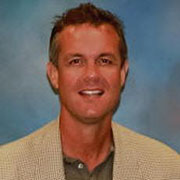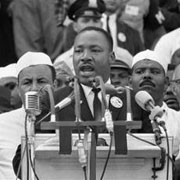-
(单词翻译:双击或拖选)
THIS IS AMERICA - Exploring the Art of Rhetoric1
STEVE EMBER: Welcome to THIS IS AMERICA in VOA Special English. I’m Steve Ember.
SHIRLEY GRIFFITH: And I’m Shirley Griffith. This week on our program, we learn about the art of rhetoric and tell you about a website that brings American rhetoric to life.
(MUSIC)
STEVE EMBER: We use rhetoric every time we use language, whether giving a speech or talking with a friend. So what is rhetoric? Dictionaries list several meanings for this word. One is the study of using language effectively. Another is the art of using language to persuade, influence or please.
The Greek philosopher Aristotle described rhetoric as "the ability, in each particular case, to see the available means of persuasion2." But the word can also have a negative meaning, like when a politician gives a speech and critics dismiss it as "rhetoric." What they mean is, it sounded good, but lacked substance.
Michael Eidenmuller knows all about rhetoric, and he says it sometimes gets a bad name.
 |
| Former U.S. President Ronald Reagan in front of the Brandenburg Gate in West Berlin, on June 12, 1987 |
MICHAEL EIDENMULLER: "Rhetoric is not inherently evil or corrupt3, in my view. It's a neutral tool or technology that has and is and will be used for both evil and ill."
Mr. Eidenmuller is a communications professor at the University of Texas at Tyler. About ten years ago, he created a Web page for his students. It included links to famous speeches on other websites. The idea was to create a resource that his students could use in their studies.
The list of speeches grew, and so did the popularity of the page.
SHIRLEY GRIFFITH: Then, in two thousand four, Mr. Eidenmuller posted a link to the speech that Senator Zell Miller4 gave at the Republican National Convention.
ZELL MILLER: “…For my family is more important to me than my Party.”
 |
| Michael Eidenmuller |
Shortly after that, the Web page received more hits than the server computer at the university could handle. As a result, Mr. Eidenmuller created a separate website and called it American Rhetoric.
AmericanRhetoric.com is an online speech bank of thousands of speeches. It gets as many as six hundred thousand visits each month during the school year in the United States. In the summer months, the number falls to about two hundred thousand visits a month.
Professor Eidenmuller says many students learning English outside the United States also use his website. It includes text, audio and in some cases video of some of the most popular speeches of our time.
STEVE EMBER: People can have different reactions to a speech depending on whether they listen to it, watch it or read it.
MICHAEL EIDENMULLER: "Attending to one or to multiple mediums does tend to produce different perspectives and encourage different judgments5 on any given speech or speaker."
Professor Eidenmuller points to the example of the candidate debates in the nineteen sixty presidential election. This was the first series of nationally televised debates between American presidential candidates. The public was able to hear and see John Kennedy, the Democratic candidate, and Richard Nixon, the Republican candidate, as they debated.
Nixon had suffered a knee injury and had spent time in the hospital before the first debate. He had lost weight as a result, and looked skinny and unhealthy. Kennedy had been campaigning in California. He arrived at the debate looking healthy, fit and suntanned, although the broadcast was in black-and-white.
People who listened to that first debate on the radio largely felt Nixon had performed better. But those who watched the debate on television were influenced by what they saw in addition to what they heard. Professor Eidenmuller says those who watched the debate were more likely to feel that Kennedy had won.
MICHAEL EIDENMULLER: "So mediums do matter."
(MUSIC)
SHIRLEY GRIFFITH: There are many rhetorical methods and devices that can add to good speech. These often have Latin or Greek names.
For example, anaphora is when a speaker repeats the same words at the start of sentences or phrases that follow each other. Hillary Clinton, then the first lady, used anaphora in her speech at the Democratic National Convention in nineteen ninety-six. Notice her use of the phrase "it takes."
 |
| Hillary Clinton addresses the Democratic National Convention in Chicago, in 1996 while she was first lady of the United States |
HILLARY CLINTON: “To raise a happy, healthy and hopeful child, it takes a family; it takes teachers; it takes clergy7; it takes business people; it takes community leaders; it takes those who protect our health and safety. It takes all of us.”
An analogy is a comparison made to show a similarity between two things. In the movie "Man of the Year," a political comedian8 -- played by Robin9 Williams -- accidentally wins the presidency10. He uses an analogy.
ROBIN WILLIAMS: "Remember, ladies and gentlemen, it’s an old phrase, basically anonymous11 -- that politicians are a lot like diapers: They should be changed frequently and for the same reason. Keep that in mind next time you vote. Good night.”
STEVE EMBER: A metaphor12 is another figure of speech used to suggest a comparison between two things. The civil rights leader Martin Luther King Junior used this metaphor in one of the most famous speeches of all time.
MARTIN LUTHER KING: "With this faith we will be able to transform the jangling discords13 of our nation into a beautiful symphony of brotherhood14."
 |
| Martin Luther King Jr. gave his "I Have a Dream" speech to hundreds of thousands of marchers gathered at the Lincoln Memorial in 1963 |
Professor Eidenmuller says the Reverend King's "I Have a Dream" speech is by far the most popular speech on the American Rhetoric site. It took place at the Lincoln Memorial on August twenty-eighth, nineteen sixty-three, during a huge march on Washington.
MARTIN LUTHER KING: " … I have a dream that my four little children will one day live in a nation where they will not be judged by the color of their skin but by the content of their character. I have a dream today!"
AmericanRhetoric.com includes a list of the "Top 100 Speeches of the 20th Century." These include the remarks that President Ronald Reagan gave at the Brandenburg Gate in West Berlin in June of nineteen eighty-seven. President Reagan was often called "the Great Communicator." Here is part of what he said.
RONALD REAGAN: "We welcome change and openness; for we believe that freedom and security go together, that the advance of human liberty -- the advance of human liberty can only strengthen the cause of world peace.”
"There is one sign the Soviets16 can make that would be unmistakable, that would advance dramatically the cause of freedom and peace.
"General Secretary [Mikhail] Gorbachev, if you seek peace, if you seek prosperity for the Soviet15 Union and Eastern Europe, if you seek liberalization: Come here to this gate.”
"Mr. Gorbachev, open this gate.”
"Mr. Gorbachev -- Mr. Gorbachev, tear down this wall!”
SHIRLEY GRIFFITH: In nineteen forty-five, World War Two ended and the United Nations began. Three years later, fifty-eight states approved the Universal Declaration of Human Rights. Former first lady Eleanor Roosevelt had worked hard for the declaration. She spoke17 in honor of its adoption18 at a UN meeting in Paris on December ninth, nineteen forty-eight.
ELEANOR ROOSEVELT: "We stand today at the threshold of a great event both in the life of the United Nations and in the life of mankind. This Universal Declaration of Human Rights may well become the international Magna Carta of all men everywhere. We hope its proclamation by the General Assembly will be an event comparable to the proclamation of the Declaration of the Rights of Man by the French people in seventeen eighty-nine, the adoption of the Bill of Rights by the people of the United States, and the adoption of comparable declarations at different times in other countries."
STEVE EMBER: Another area on AmericanRhetoric.com contains recordings19 about the terrorist attacks of September eleventh, two thousand one. These include the first statement that President George W. Bush made to reporters during a visit to an elementary school in Sarasota, Florida.
GEORGE W. BUSH: "… Today, we've had a national tragedy. Two airplanes have crashed into the World Trade Center in an apparent terrorist attack on our country.
"I have spoken to the vice6 president, to the governor of New York, to the director of the FBI, and have ordered that the full resources of the federal government go to help the victims and their families, and -- and to conduct a full-scale investigation20 to hunt down and to find those folks who committed this act.
'"Terrorism against our nation will not stand. And now if you [would] join me in a moment of silence."
SHIRLEY GRIFFITH: The American Rhetoric website also includes quizzes and exercises related to the art of rhetoric. People who want to learn more about rhetoric can take classes in rhetorical theory. There are also books like "Farnsworth's Classical English Rhetoric" published in two thousand ten. Author Ward21 Farnsworth offers eighteen chapters' worth of rhetorical devices.
And there is another way to improve your skills. Michael Eidenmuller at AmericanRhetoric.com says you can study the speakers you admire.
MICHAEL EIDENMULLER: "Read and listen and watch the great speeches and great speakers. I would recommend listening to those speeches. If you find a speaker whose delivery you particularly like, try mimicking22 it."
(MUSIC)
STEVE EMBER: Our program was written and produced by Brianna Blake. I’m Steve Ember.
SHIRLEY GRIFFITH: And I’m Shirley Griffith. What are some of your favorite speeches? Tell us at voanews.cn, where people learning English can also find transcripts23, audio and video to read, listen and learn. Join us again next week for THIS IS AMERICA in VOA Special English.
 收听单词发音
收听单词发音
1
rhetoric

|
|
| n.修辞学,浮夸之言语 | |
参考例句: |
|
|
|
2
persuasion

|
|
| n.劝说;说服;持有某种信仰的宗派 | |
参考例句: |
|
|
|
3
corrupt

|
|
| v.贿赂,收买;adj.腐败的,贪污的 | |
参考例句: |
|
|
|
4
miller

|
|
| n.磨坊主 | |
参考例句: |
|
|
|
5
judgments

|
|
| 判断( judgment的名词复数 ); 鉴定; 评价; 审判 | |
参考例句: |
|
|
|
6
vice

|
|
| n.坏事;恶习;[pl.]台钳,老虎钳;adj.副的 | |
参考例句: |
|
|
|
7
clergy

|
|
| n.[总称]牧师,神职人员 | |
参考例句: |
|
|
|
8
comedian

|
|
| n.喜剧演员;滑稽演员 | |
参考例句: |
|
|
|
9
robin

|
|
| n.知更鸟,红襟鸟 | |
参考例句: |
|
|
|
10
presidency

|
|
| n.总统(校长,总经理)的职位(任期) | |
参考例句: |
|
|
|
11
anonymous

|
|
| adj.无名的;匿名的;无特色的 | |
参考例句: |
|
|
|
12
metaphor

|
|
| n.隐喻,暗喻 | |
参考例句: |
|
|
|
13
discords

|
|
| 不和(discord的复数形式) | |
参考例句: |
|
|
|
14
brotherhood

|
|
| n.兄弟般的关系,手中情谊 | |
参考例句: |
|
|
|
15
Soviet

|
|
| adj.苏联的,苏维埃的;n.苏维埃 | |
参考例句: |
|
|
|
16
soviets

|
|
| 苏维埃(Soviet的复数形式) | |
参考例句: |
|
|
|
17
spoke

|
|
| n.(车轮的)辐条;轮辐;破坏某人的计划;阻挠某人的行动 v.讲,谈(speak的过去式);说;演说;从某种观点来说 | |
参考例句: |
|
|
|
18
adoption

|
|
| n.采用,采纳,通过;收养 | |
参考例句: |
|
|
|
19
recordings

|
|
| n.记录( recording的名词复数 );录音;录像;唱片 | |
参考例句: |
|
|
|
20
investigation

|
|
| n.调查,调查研究 | |
参考例句: |
|
|
|
21
ward

|
|
| n.守卫,监护,病房,行政区,由监护人或法院保护的人(尤指儿童);vt.守护,躲开 | |
参考例句: |
|
|
|
22
mimicking

|
|
| v.(尤指为了逗乐而)模仿( mimic的现在分词 );酷似 | |
参考例句: |
|
|
|
23
transcripts

|
|
| n.抄本( transcript的名词复数 );转写本;文字本;副本 | |
参考例句: |
|
|
|















